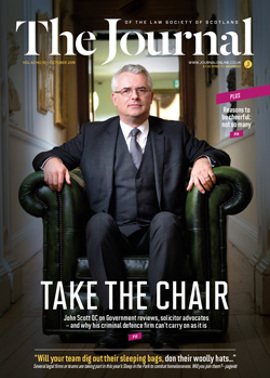Private revolution

I was speaking at a private client conference a few months ago. During the questions for the panel session, we were asked to try to predict what major changes we might see by 2028. Thinking back, the responses were fairly humdrum. Predicting the future is obviously a difficult and problematic pursuit, especially when I consider the changes I have seen since I started practising almost 25 years ago. Where to start?
Programmed to care
Scotland has an aging population and Brexit is likely to exacerbate this. The amount of time we therefore spend acting for our elderly clients is likely to increase.
I was recently at a great talk given by Professor June Andrews, hosted by Solicitors for the Elderly Scotland. While the talk concentrated mainly on dementia issues, it got me thinking about some of the wider issues that affect our elderly population.
It also reminded me of the conference I mentioned above.
Dementia issues include loneliness, isolation, the provision of care, the cost of this care, the burden placed on carers, respite care, getting to and from doctor and hospital appointments, medical advances and end-of-life issues.
Ask yourself what one thing might have an impact on some or all of these issues? Robots. Yes, robots. Will we soon see robots as social companions and carers? Almost certainly, yes. The number of articles and TV programmes reporting on this subject testifies to this.
For example, “ElliQ” (elliq.com) is described as one of the most advanced social companion robots in the world. It has been designed to convey emotion through different speech tones, lights and body language to be as engaging as possible. Its primary purpose is to prevent people feeling socially isolated, and keep them connected to family and friends.
Japan is generally acknowledged to be a world leader in the development and use of robots. The Japanese Government has predicted that its aging society is facing a shortfall of 370,000 caregivers by 2025. It wants to increase community acceptance of technology that could help fill the gap in the nursing and caring workforce. The developers of these products in Japan have focused their efforts on producing simple robotic devices that help frail residents get out of bed and into a wheelchair, or ease senior citizens into bathtubs.
The potential benefits are obvious, but this also raises a number of legal and philosophical concerns. It is a debate that has only just started here in Scotland.
Add to this the introduction of driverless cars. How will this impact on the way the elderly live? We simply do not know yet. And yes, there are robot pets too.
Medical advances
Major advances are predicted in such diverse areas as dementia, cancer, joint replacements and diabetes. It is also predicted there will be major advances in the medical technology used in our hospitals, care homes and even our own homes. What might this mean? Will more people live longer? Almost certainly, yes. Will they have an improved quality of life for longer? Almost certainly, yes. Will they be able to remain living at home for longer? Possibly. Will they be able to work longer? Possibly. Will they need to work longer? Almost certainly, yes. For some people, will it mean even longer retirements? Almost certainly, yes.
Executries online
Now to executries. There is no doubt that our clients’ lives are becoming more complicated. There are numerous reasons for this. These include the number of clients who die owning property in multiple jurisdictions, digital assets and, it seems, a greater appetite for disputes.
In the next decade, I think there will be a gradual move towards what are termed digital wills, and possibly even video wills. This door is already partially open due to the introduction of legislation on digital signatures.
Then there is blockchain technology. Blockchain in very simple terms is a list of records, called blocks, which are linked (in chains) using cryptography.
Imagine a single email sent on the death of a client to a central point, which notifies each of the participating organisations. Once the veracity of the notification is confirmed, each local organisation searches its database for the deceased and forwards on relevant information.
A possible list of organisations could include:
- National Records of Scotland;
- Scottish Will Register (another prediction);
- Tax and benefit agencies;
- Registers of Scotland;
- all local authorities – for, among other things, registrations of death, social work, and local taxes;
- Scottish Courts Service;
- Companies House;
- banks/pension/insurance providers;
- utility companies;
- DVLA;
- Passport Office;
- Office of the Public Guardian;
- NHS Scotland;
- Police Scotland;
- Accountant in Bankruptcy;
- Office of the Scottish Charities Regulator;
- Post Office.
Think of this as an advancement on the “Tell Us Once” service.
Hopefully, we will also see the development of online confirmation applications. Will this mean the more efficient administration of estates? Possibly. If so, should we consider shortening the “six-month rule”? I can almost hear the intake of breath as I suggest that.
Digital asset search
Another likely change concerns digital assets. A digital asset search will routinely be undertaken and each provider notified of the death. They, in turn, will confirm what, if any, the deceased’s instructions were regarding that particular asset. Legislation will have been passed giving an executor the right to access and preserve these assets.
I also think that within a few years, the identification of all beneficiaries will automatically be checked. It is further likely a bankruptcy search will be undertaken for all beneficiaries.
New legislation
We will hopefully see new legislation covering:
- electronic wills;
- access to digital assets for executors, attorneys and family members;
- protection for executors distributing an estate within six months of death;
- a Scottish Will Register;
- provision for more than two parents to be named on birth certificates;
- trusts law consolidation and update;
- another Succession Act.
One caveat to all of this: never ignore the law of unintended consequences.
Finally, a number of other jurisdictions have now enacted assisted dying legislation.
I suspect Scotland will follow them within the next decade.
One thing I do not see changing is the need for experienced and caring private client solicitors.
In this issue
- Online and out of line
- Timing the test for detriment
- The power of conversation
- Making Scotland an ACE aware nation
- Reading for pleasure
- Opinion: Jane Mair
- Book reviews
- Profile: Amanda Davy
- President's column
- Round Scotland from A to Z
- People on the move
- When crime no longer pays
- Hold tight for Brexit
- Debt: finding the right formula
- The thick of it
- Fringe benefits boost conference appeal
- Private revolution
- Document Data Group Form Partnership with Law Pro
- Where have all the new firms gone?
- New specialist land registration practice launches
- Sentences in many guises
- Law firms: how to attract and retain the best talent
- Licensing Armageddon – again?
- Planning Bill changing shape
- HMRC called offside in referees case
- Powers of attorney: two essential practice points
- Better access to the law
- Finding the right blend
- Look out for AML certificate launch
- Public policy highlights
- Clients, care, competence and... cancer
- Practice rights and Brexit: working in the UK
- Claims of our age
- Ask Ash
- Paralegal pointers
- A sleep in the park






